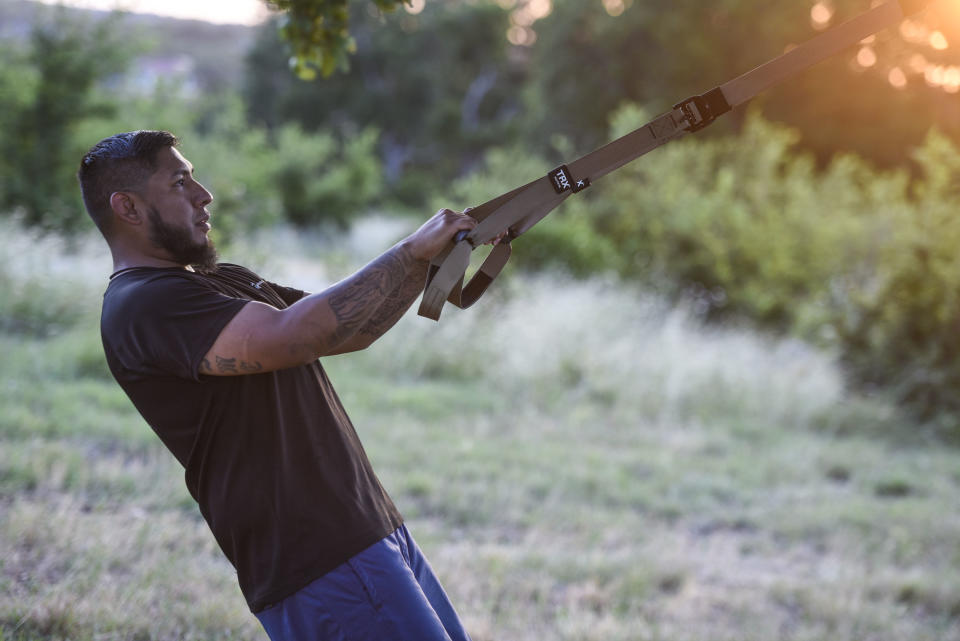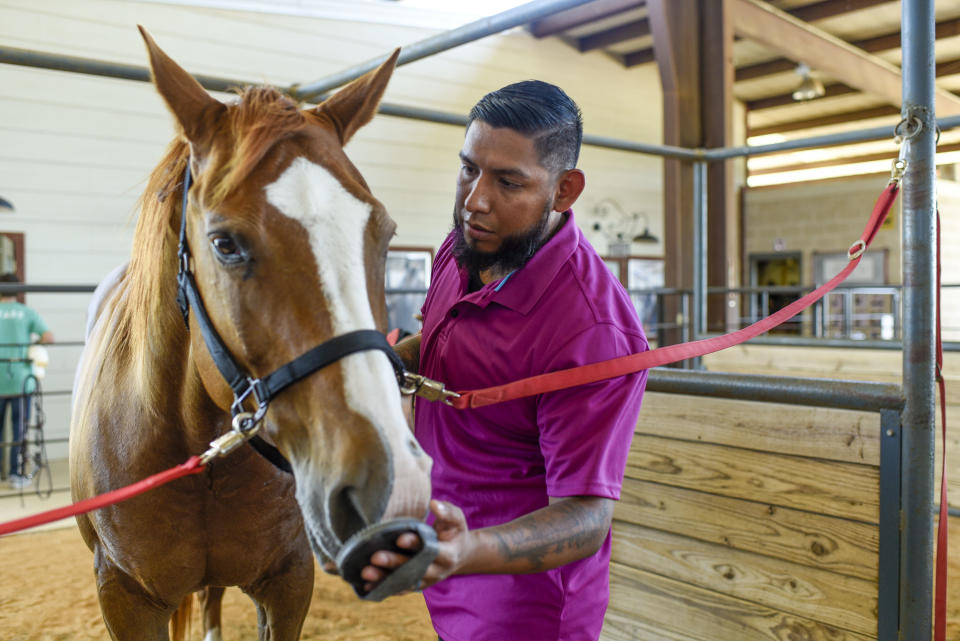‘My life has a purpose’: Post-9/11 veteran describes his turning point in PTSD recovery
Paid for by Wounded Warrior Project
You can empower wounded warriors like Jose to overcome adversity and achieve their goals. Give to Wounded Warrior Project today.
These days, combat veteran Jose Rodriguez spends time gardening with his daughters, taking walks with his wife and practicing mindfulness in art therapy sessions. But when he first returned home from active duty, his daily routine was much different.
“I remember looking at myself in the mirror and knowing I still couldn’t see who I was,” he says. “I still couldn’t love who I was. I still didn’t have that identity.”
His wife, Shammah, recalls a darkness in his eyes, and Rodriguez says that a breakdown of his identity fed the pain he endured struggling with post-traumatic stress disorder (PTSD), which led to suicidal thoughts. “That’s where the destruction started, trying to find out who I was in life.”
Rodriguez found support through Wounded Warrior Project, a veterans service organization that serves over 180,000 mentally or physically injured post-9/11 veterans and family members. But before receiving the physical and mental health help he needed, Rodriguez found solace from his pain and anxiety in alcohol. “When I came back, I just started drinking. I started drinking heavily; I abused it. It felt good to drink. It felt good to be numb.”
Rodriguez is one of many veterans who face mental health challenges during their transition out of military service. The 2020 Annual Wounded Warrior Project Survey — a survey of nearly 30,000 post-9/11 veteran respondents — shared findings that more than 90 percent of surveyed veterans have experienced a severe mental injury during their service (83 percent of which reported more than one such experience) and nearly 95 percent of veterans sustained severe physical injuries during service (87 percent of which reported multiple injuries).
Despite the need to find physical and mental health support, many returning service members must overcome treatment barriers, including societal stigmas, accessibility and affordability. That is where organizations such as Wounded Warrior Project come into the picture. Wounded Warrior Project is free of charge to post-9/11 veterans and their families and provides support without geographical restrictions. The organization offers programs across physical and mental health and wellness, financial wellness and peer community support, in addition to clinical programs across their Warrior Care Network of academic medical center partners.

A turning point in PTSD recovery
It wasn’t until Rodriguez and his family found Wounded Warrior Project that he was able to reach a turning point in his mental health journey. Rodriguez remembers the veteran service organization’s logo — a silhouette of one military service member carrying another — convincing him to engage with their services. Through Wounded Warrior Project, Rodriguez was able to find a community and support network of not only doctors and treatment professionals, but fellow wounded veterans and families.
Rodriguez credits Soldier Ride, a multi-day riding and cycling event, as being especially impactful.
“It’s a no-drop ride, which means we don't leave anybody behind,” says James Herrera, Wounded Warrior Project’s physical health and wellness director. “It's very high in that esprit de corps of you not leaving your fellow man or woman behind. I'd say one of the reasons that Soldier Ride is so valuable is because it's not just physical. It's also got that community engagement, social element to it. The comradery is a kind of ongoing motivation and accountability.”

The physical challenges that Jose overcame while participating in Soldier Ride and other programs is a testament to how small accomplishments play a part in broadening a warrior’s understanding of their capacity to recover and endure. Facing physical fears helped Jose realize his potential to not only receive support from others but to take control of his own well-being and strengthen his ability to cope with his PTSD in everyday life. Rodriguez says he was pushed outside his comfort zone, and that showed him how much he is capable of. “We have scars that we carry, that we hold on to,” he says. “Just because the scars are there doesn’t mean that we are any less than what we were.”
The link between psychological and physical well-being
“Recognizing that close to 80 percent of post-9/11 veterans report struggling with PTSD, we know that depression and stress need to be addressed,” Herrera says. “We know that coping mechanisms can be a bit of a challenge. And so we use exercise to help veterans improve their mood, increase their resilience to stress and improve memory — particularly for veterans dealing with traumatic brain injuries.”
Herrera says that veterans who come to Wounded Warrior Project for physical health support often find that their mental health improves first and then reinforces and sustains the improvement of their physical health. He describes this as a cyclical process: “If you're more physically active, you're going to have better mental health outcomes.”

Among the other programs offered by Wounded Warrior Project that Rodriguez has attended are a surf camp, therapy sessions, community events and art workshops. And while he says he’s made great strides in his physical and mental health recovery, he continues to learn and grow with the organization. “I’m not done,” he says. “About two years ago is when I was going to take my life. Thank God that I didn’t because I can sit here today and look back on that and know that my life has a purpose, and that I was created for that purpose. And the mission continues.”
To learn more about Jose Rodriguez’s story, watch the video above.
From Wounded Warrior Project:
Wounded Warrior Project is a nonprofit organization established to support and address the physical and mental health needs of post-9/11 injured veterans and their families. To learn more, visit woundedwarriorproject.org.
This article was sponsored by Wounded Warrior Project and co-created by RYOT Studio. Yahoo News editorial staff did not participate in the creation of this content.

